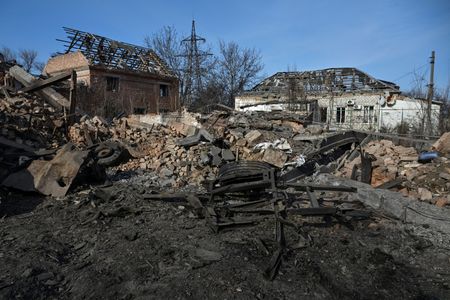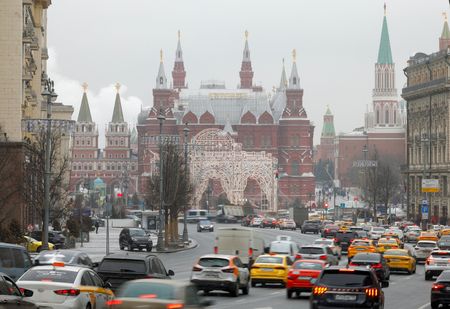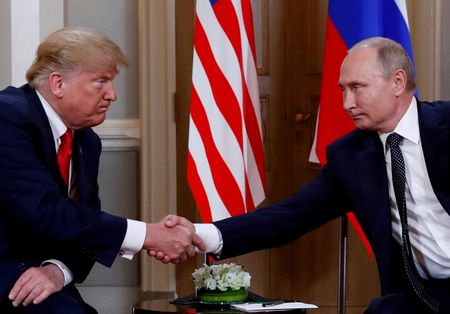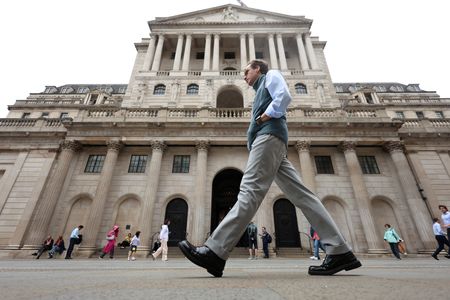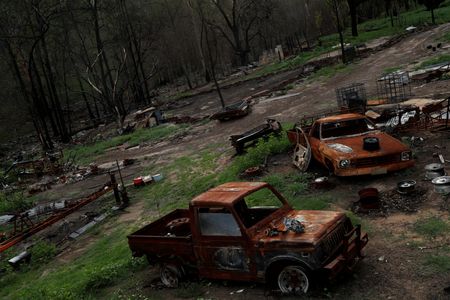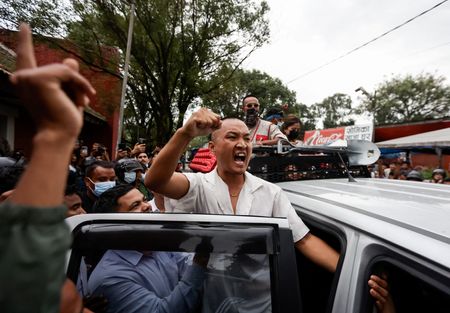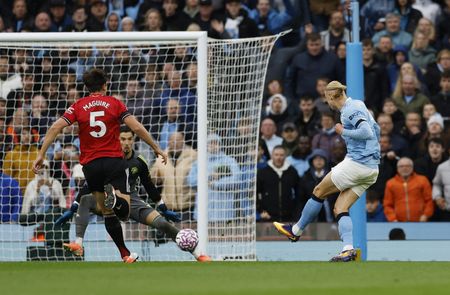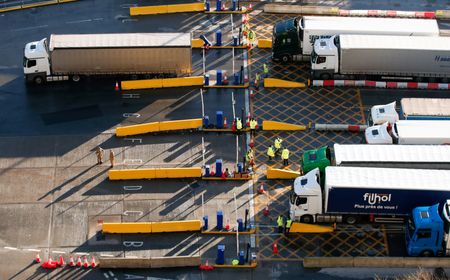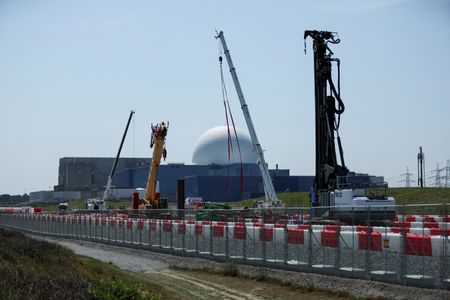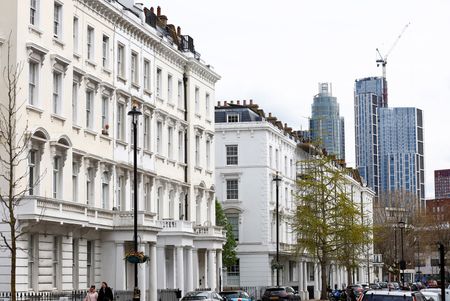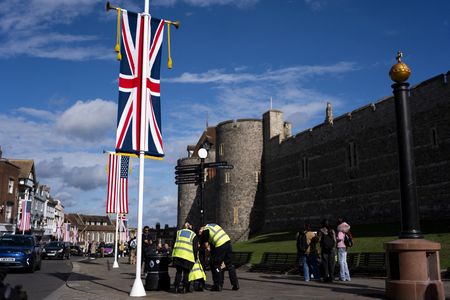By Tom Balmforth and Bart H. Meijer
KYIV/BRUSSELS (Reuters) -U.S. President Donald Trump said on Thursday that Ukraine would be involved in peace talks with Russia, although Kyiv said it would be premature to speak with Moscow at a security conference on Friday.
Trump, speaking to reporters at the White House, said Ukraine would have a seat at the table during any peace negotiations with Russia over ending the war.
“They’re part of it. We would have Ukraine, and we have Russia, and we’ll have other people involved, a lot of people,” Trump said.
Asked whether he trusts Putin, he said: “I believe that he would like to see something happen. I trust him on this subject.”
Trump said U.S. and Russian officials would meet in Munich on Friday and that Ukraine was also invited.
An adviser to Ukrainian President Volodymyr Zelenskiy, however, said Kyiv does not expect to hold talks with the Russian side at the annual Munich Security Conference on Friday, and believes the U.S., Europe and Ukraine need a common position before talks with Moscow.
Trump also suggested to reporters there would be a meeting of top officials, although not leaders, from all three countries in Saudi Arabia next week aimed at ending the war.
On Thursday, U.S. Secretary of State Marco Rubio discussed “the need for bold diplomacy” to end the war in a call with Ukrainian Foreign Minister Andrii Sybiha, the State Department said.
Russia’s financial markets soared and the price of Ukraine’s debt rose at the prospect of the first talks in years to end Europe’s deadliest war since World War Two.
Trump’s unilateral overture to Putin on Wednesday, accompanied by apparent concessions on Ukraine’s principal demands, raised alarm for both Kyiv and the European allies in NATO who said they feared the White House might make a deal without them.
“We, as a sovereign country, simply will not be able to accept any agreements without us,” Zelenskiy said.
Ukraine would “of course” participate in peace talks in some way, but there would also be a bilateral negotiation track between the United States and Russia, said Kremlin spokesperson Dmitry Peskov.
The United Arab Emirates has told the United States it also wants to host talks aimed at ending the war in Ukraine, Reuters reported.
European officials took an exceptionally firm line in public towards Trump’s peace overture to Putin, saying any agreement would be impossible to implement unless they and the Ukrainians were included in negotiating it.
“Any quick fix is a dirty deal,” European foreign policy chief Kaja Kallas said. She also denounced the apparent concessions offered in advance.
A European diplomatic source said ministers had agreed to engage in a “frank and demanding dialogue” with U.S. officials – some of the strongest language in the diplomatic lexicon – at the Munich conference beginning on Friday.
‘BEST NEGOTIATOR ON THE PLANET’
On Wednesday, Trump made the first publicly acknowledged White House call with Putin since Russia’s February 2022 full-scale invasion, and then followed it up with a call to Zelenskiy. Trump said he believed both men wanted peace.
The Trump administration also said openly for the first time that it was unrealistic for Ukraine to expect to return to its 2014 borders or join the NATO alliance as part of any agreement, and that no U.S. troops would join any security force in Ukraine that might be set up to guarantee a ceasefire.
But on Thursday, a senior U.S. official said the United States had not ruled out potential NATO membership for Ukraine or a negotiated return to pre-2014 borders, contradicting the earlier comments.
U.S. Defense Secretary Pete Hegseth said on Thursday the world was fortunate to have Trump, the “best negotiator on the planet, bringing two sides together to find a negotiated peace”.
Kremlin spokesman Peskov said Moscow was “impressed” by Trump’s willingness to seek a settlement.
Russia seized Ukraine’s Crimea peninsula and its proxies captured territory in the east in 2014, before its full-scale invasion in 2022 when it captured more land in the east and south.
Ukraine pushed Russian invaders back from the outskirts of Kyiv and recaptured swathes of territory in 2022, but its outmanned and outgunned forces have slowly ceded more land since a failed Ukrainian counter-offensive in 2023.
Relentless fighting has killed or injured hundreds of thousands of troops on both sides and pulverised Ukrainian cities.
There has been no narrowing of positions on either side. Moscow demands Kyiv be rendered permanently neutral in any peace deal; Kyiv says Russian troops must withdraw and it must win security guarantees comparable to NATO membership to prevent future attacks.
Ukrainian officials have acknowledged in the past that full NATO membership may be out of reach in the short term, and that a hypothetical peace deal could leave some occupied land in Russian hands.
But Ukraine’s Sybiha said Kyiv remained committed to joining NATO, which he said was the simplest and least expensive way the West could provide the security guarantees needed to ensure peace.
NATO’s Secretary-General Mark Rutte said it was important Moscow understand the West remained united, noting that Ukraine had never been promised a peace deal would include alliance membership.
Some Ukrainians saw Trump’s moves as a betrayal.
Myroslava Lesko, 23, standing near a sea of flags in downtown Kyiv honouring fallen troops, said: “It truly looks as if they want to surrender Ukraine, because I don’t see any benefits for our country from these negotiations or Trump’s rhetoric.”
However, Ukrainians have been worn out by three years of war, and many say they are prepared to sacrifice some aims to achieve peace.
Many were frustrated by U.S. policy under Trump’s predecessor Joe Biden, who vowed to help Ukraine win all its land back and provided tens of billions of dollars worth of military hardware, but only after delays that Ukrainian commanders say let Russian forces regroup.
Trump, at least, was being forthright about the limits of U.S. support, said Tymofiy Mylovanov, president of the Kyiv School of Economics.
“The difference between Biden and Trump is that Trump says out loud what Biden was thinking and doing about Ukraine,” he said on social media.
(Additional reporting by Yurii Kovalenko, Dan Peleschuk, Doina Chiacu and Andrea Shalal; Writing by Peter Graff and Rod Nickel; Editing by Jon Boyle, Gareth Jones, William Maclean and Daniel Wallis)

